
No matter what, where or how you ride, there is a cornerstone which is important to acknowledge: mountain biking was born a sport. Competition has been at the forefront of defining what constitutes a mountain bike since before they were even known as such. Faster was the focus, the clock the unflinching enemy. Economics and fashion may have propelled the mountain bike forward over the years, but the core element that has allowed it to weather the storm and survive to be the passion that we all enjoy today is the fact that it is, first and foremost, a competitive sport.
That sport first sprang to life amidst the much-storied and somewhat exotic-smelling dirt tracks of Mount Tamalpais, California in the late 1960s and early 1970s. Knobbly tyres were fitted to slack angled beach cruisers to help them cut through deep, silty gravel. The names of the early pioneers (Mike Sinyard, Gary Fisher, Charlie Kelly et al) are writ large in the history books. Speed was key the mountain bike didn't begin life as a commuter vehicle or an aesthetically-pleasing hot rod. Early tech advancements were born out of a need to go faster. The now iconic Repack races were named after the competitors' hurried need to re-pack their coaster hubs with grease in between runs. The film Klunkerz (the name given to the precursors of the mtb) features something much more than just a bimble down memory lane - it's a glimpse at the kind of speed and danger that still resonates with fans of racing today. Right from the start, competition was the driving force.
Mountain biking steadily grew, and although some of the technologies that followed those early years may now appear laughable, many stuck. The mass-market discovered the appeal of off-road cycling and exploration thanks to the ruggedness of components developed to take a beating on race day.
This story is from the April 2022 edition of Mountain Bike Rider.
Start your 7-day Magzter GOLD free trial to access thousands of curated premium stories, and 9,000+ magazines and newspapers.
Already a subscriber ? Sign In
This story is from the April 2022 edition of Mountain Bike Rider.
Start your 7-day Magzter GOLD free trial to access thousands of curated premium stories, and 9,000+ magazines and newspapers.
Already a subscriber? Sign In
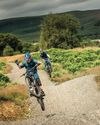
Best places to ride with your kids
Five top venues to keep the nippers entertained this summer
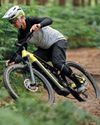
CANNONDALE MOTERRA NEO CARBON 2
It’s got more suspension tunes than a Hitchcock movie, but will this Moterra thrill us or chill us?

100% GLENDALE GLASSES
When it comes to eyewear, having a large lens not only offers a lot more protection from trail splatter, it puts the frames further out from your field of view, allowing you to focus on the terrain in front of you. The Glendale is absolutely vast, and actually has a lens size akin to a full downhill goggle, so you literally can’t see the top or sides of the frame.
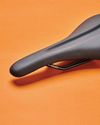
DMR STAGE 2 MTB RAIL SADDLE
DMR's new Stage 2 MTB Rail is one of those new/old products. The shape and construction are identical to the existing Oi Oi saddle, but the company has wrapped it in a new skin and added some harder-wearing reinforcement to the edges. It's also toned down the lairy graphics; this saddle only comes in plain black.

STRAIGHT TORQUING - GUY KESTEVEN
Has tech taken the hard work and fun out of mountain biking, or should we embrace evolution and roll with it?

STORM FORCE
Manon Carpenter may have retired from downhill competition, but her new role as a trail advocate is achieving results far beyond the race track
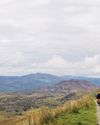
SWEAT AND SLATE
We ride 140 miles through Snowdonia on Cycling UK's newest and gnarliest long-distance trail

HEAD SPACE
New guidance reveals how to spot concussion, and how best to treat it

LATE SUMMER LOVIN'
Classic UK holiday hotspots that really shine when the crowds have gone
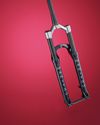
HOT STUFF
WHAT WE'RE EXCITED ABOUT THIS MONTH